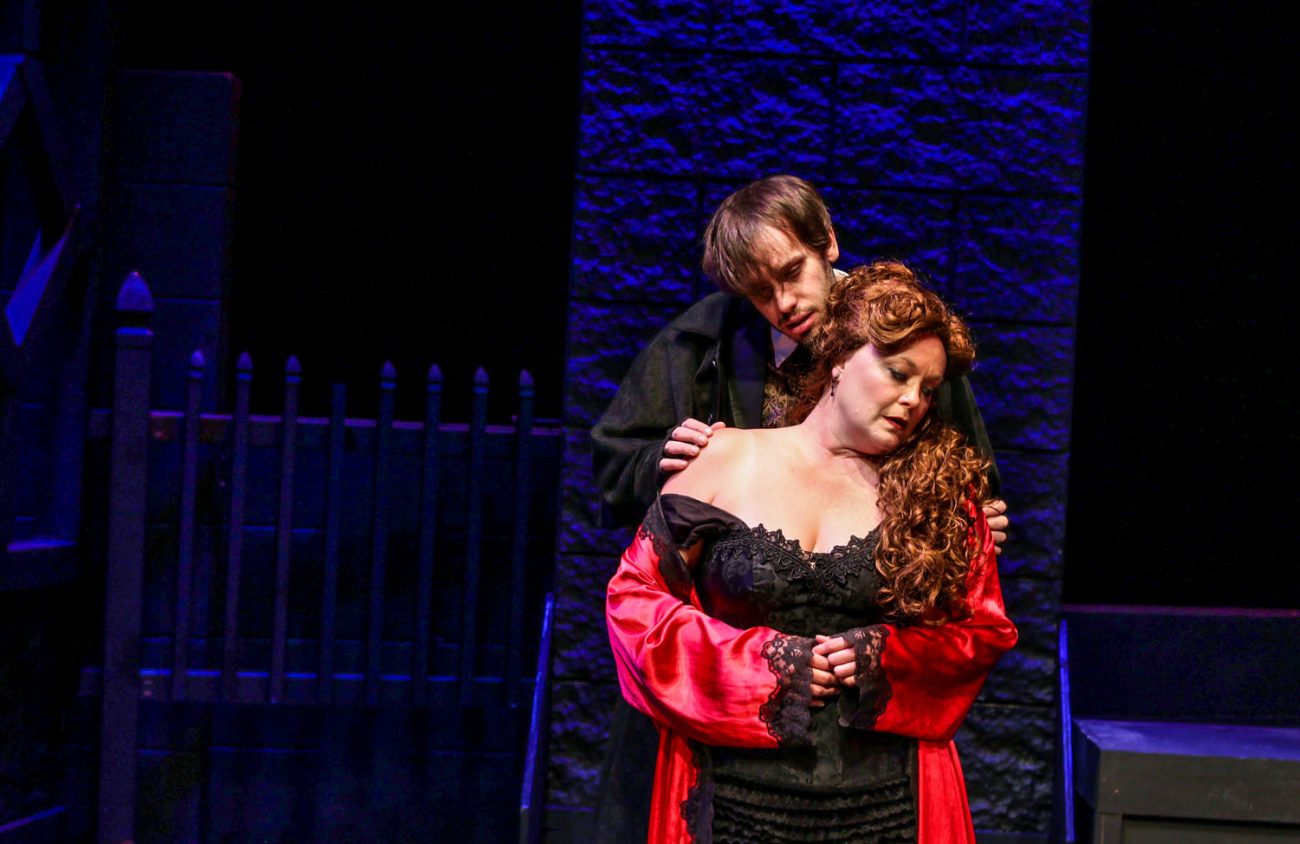Like so much that descends to us from the rich and fertile period of the late 19th century — Freud, Nietzsche and Marx, to name but the obvious heavies — Robert Louis Stevenson’s gothic novella The Strange Case of Dr. Jekyll & Mr. Hyde has entered common parlance, describing an aspect of the human condition, and not a particularly pleasant one.
The story of Jekyll and Hyde is a familiar one, as is the way it speaks to the duality of human nature, good and evil and all that. Like so many writers of his time, Stevenson intuits the catastrophes of the coming century, and how questions of addiction, social engineering, mental illness and amoral scientific advancement would plague us in the form of mass murder and, by extension, our own extinction as a species.
With admirable relish and a strong sense of the macabre, director Mark VanBeever digs into the darkest aspect of Jekyll & Hyde, the Broadway musical currently on stage at Cottage Theatre. In a production that calls to mind the dastardly, corrosive glee of Sweeney Todd, all shadows and leer, VanBeever turns this song-and-dance nightmare into a perfect parable for our times — a cautionary tale about innate evil that delights and disarms in equal measure.
Here, the Jekyll/Hyde split is literalized, with the role of the main character being divided between two roles: Playing the good doctor is Josh Carlton, while his evil incarnation Hyde is played with chilling malignancy by Kory Weimer, who literally shadows Carlton throughout the cottashow until those moments he seizes control.
It’s a wonderful conceit, and one which almost got the show canceled until a last-minute reprieve was sent from the show’s publishers in New York; apparently, it was originally deemed that VanBeever’s idea of making Jekyll and Hyde two separate parts violated artistic intent. Thankfully, the owners of the musical relented.
The musical numbers, accompanied by a pit orchestra, are fantastic, and the choreography is expertly conceived and realized, creating a busy, teeming atmosphere that brings to mind the crepuscular noir of Fritz Lang. Overall, the production evokes a humid atmosphere, full of threat and insidious intent, evoking the twilit claustrophobia of darkened city streets crawling with evil.
The cast is big, full of unnamed ensemble parts, and the most important roles are exceptionally well cast. It would be impossible to list them all here, but I will mention a pair of stalwarts who certainly elevate the show, in terms of both vocal and acting chops: Phoebe Gildea as Emma, Dr. Jekyll’s long-suffering fiancée, and the always strong Tracy Nygard, who sizzles as Lucy Harris, a tavern girl taken in by the sexualized gaslighting of Jekyll as he succumbs more and more to his Hyde-ness.
It’s rare to see a community theater put on such a vibrant (in a dark, gothic way) and lush production. VanBeever likes to take risks and go big, and he has more than enough talent and experience to pull it off. Forged through difficulties that had the cast and crew mired in uncertainty to the last minute, this show is something of a triumph.
It’s not a perfect production — erratic volume was an issue the night I attended, and the performances proved somewhat uneven — but any minuscule faults it might have are erased in the boisterously gloomy swoon on stage.
Cottage Theatre’s Jekyll & Hyde is an entertaining examination of the good and evil in us all, and in its own way it provides antidote as well as an answer to the fear that seems to hold us hostage — and I’m not just talking about Halloween.
Jekyll & Hyde plays through Oct. 29 at Cottage Theatre in Cottage Grove; $15-$25, tickets at 541-942-8001 or cottagethreatre.org.
